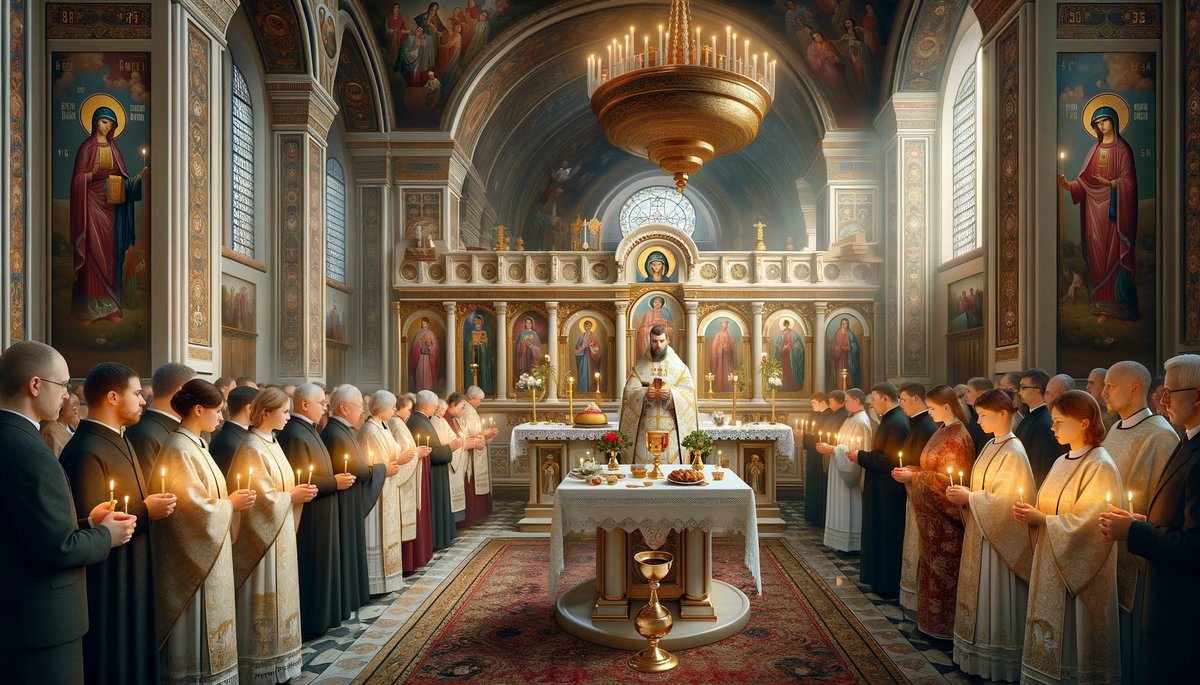Home>Theology and Spirituality>How Do Presbyterians Take Communion


Theology and Spirituality
How Do Presbyterians Take Communion
Published: February 25, 2024
Peter Smith, Editorial Director at Christian.net, combines deep insights into faith, politics, and culture to lead content creation that resonates widely. Awarded for his contributions to religious discourse, he previously headed a major organization for religious communicators, enhancing dialogue on faith's societal impacts.
Learn about the Presbyterian approach to communion and its significance in theology and spirituality. Understand the practices and beliefs surrounding this sacred ritual.
(Many of the links in this article redirect to a specific reviewed product. Your purchase of these products through affiliate links helps to generate commission for Christian.net, at no extra cost. Learn more)
Table of Contents
Introduction
Communion, also known as the Lord's Supper or the Eucharist, holds profound significance in the life of Presbyterian Christians. It is a sacred sacrament that symbolizes the spiritual nourishment and unity within the body of believers. The act of partaking in communion is deeply rooted in the teachings of Jesus Christ and is a central aspect of Presbyterian worship and spiritual practice.
In this article, we will explore the theological understanding of communion in Presbyterianism, the preparation involved in partaking in this sacred sacrament, the order of the communion service, and the manner in which communion is received within Presbyterian congregations. By delving into these aspects, we aim to provide a comprehensive insight into how Presbyterians approach and engage with the profound act of communion.
The significance of communion in the Presbyterian tradition extends beyond a mere ritualistic observance; it is a deeply spiritual and communal experience that serves as a tangible expression of the believer's faith and their relationship with God and fellow believers. As we delve into the theological underpinnings and practical aspects of communion in Presbyterianism, we will gain a deeper appreciation for the rich tapestry of faith and tradition that defines this sacred sacrament within the Presbyterian Church.
Theological Understanding of Communion in Presbyterianism
The theological understanding of communion in Presbyterianism is deeply rooted in the belief in the real presence of Christ in the elements of bread and wine. Presbyterians affirm the spiritual presence of Christ during the act of communion, emphasizing the significance of the sacrament as a means of grace and spiritual nourishment for the believer's journey of faith.
Central to Presbyterian theology is the concept of the "real presence" of Christ in communion, which signifies that Christ is spiritually present in the elements of bread and wine, rather than a physical transformation of the elements. This understanding aligns with the Reformed tradition's emphasis on the spiritual nature of Christ's presence in the sacraments, emphasizing the inward and transformative work of the Holy Spirit in the hearts of believers during communion.
Presbyterians view communion as a sacred and communal act that symbolizes the unity of believers with Christ and with one another. The sharing of the bread and wine signifies the participation in the body and blood of Christ, fostering a sense of spiritual communion and fellowship within the community of believers. This theological perspective underscores the communal aspect of communion, emphasizing the unity and interconnectedness of the body of Christ.
Furthermore, Presbyterian theology emphasizes the remembrance of Christ's sacrificial death and the anticipation of his second coming during the communion service. The act of partaking in the bread and wine serves as a tangible expression of the believer's remembrance of Christ's redemptive work on the cross and the hope of his return, reinforcing the central tenets of the Christian faith within the context of the communion service.
In summary, the theological understanding of communion in Presbyterianism is characterized by a profound reverence for the real presence of Christ in the sacrament, the emphasis on spiritual communion and unity within the body of believers, and the remembrance of Christ's sacrificial death and anticipated return. This theological framework shapes the Presbyterian approach to communion, infusing the sacrament with deep spiritual significance and communal unity within the context of worship and spiritual practice.
Preparation for Communion
Preparation for communion in the Presbyterian tradition encompasses both spiritual and practical aspects, reflecting the solemnity and significance of the sacrament. The process of preparing for communion involves intentional reflection, self-examination, and a heart-oriented readiness to partake in the sacred act of communion.
Spiritually, preparation for communion involves self-examination and reflection on one's relationship with God and fellow believers. Presbyterians are encouraged to engage in introspection, examining their hearts and minds in light of their faith and the teachings of Christ. This introspective process allows individuals to assess their spiritual state, seek reconciliation with God and others, and cultivate a posture of humility and contrition before approaching the communion table.
Furthermore, preparation for communion entails a focus on spiritual renewal and recommitment to the Christian faith. It is a time for believers to reaffirm their commitment to Christ, seek forgiveness for shortcomings, and express gratitude for the redemptive work of Jesus Christ. This spiritual preparation fosters a sense of reverence and anticipation for the communion service, creating a space for believers to approach the sacrament with sincerity and spiritual attentiveness.
Practically, preparation for communion involves familiarizing oneself with the order and significance of the communion service. This may include reviewing the liturgy, understanding the symbolism of the bread and wine, and being mindful of the communal nature of the sacrament. Additionally, individuals may engage in acts of service and charity as a tangible expression of their faith and preparation for communion, reflecting the call to love and serve others as an integral part of their spiritual readiness for the sacrament.
In summary, preparation for communion in Presbyterianism encompasses spiritual introspection, self-examination, and a heart-oriented readiness to partake in the sacrament, as well as practical familiarity with the order and significance of the communion service. This intentional preparation underscores the solemnity and significance of communion, fostering a deep sense of spiritual and communal readiness as believers approach the sacred act of partaking in the body and blood of Christ.
The Communion Service
The communion service, also known as the Lord's Supper or the Eucharist, holds a central place in the worship practices of Presbyterian congregations. It is a sacred and solemn occasion that serves as a tangible expression of the spiritual nourishment and communal unity within the body of believers. The communion service is characterized by its rich symbolism, theological significance, and the profound sense of reverence that permeates the entire experience.
The order of the communion service in Presbyterianism typically follows a structured liturgy, reflecting the theological understanding and reverence for the sacrament. The service often begins with a period of reflection and preparation, allowing congregants to engage in self-examination and spiritual introspection as they prepare to partake in the sacrament. This introspective phase sets the tone for the solemnity and reverence that underpin the communion service, fostering a sense of spiritual attentiveness and readiness among the worshippers.
Central to the communion service is the recitation of the Words of Institution, where the presiding minister recounts the biblical account of the Last Supper and the words spoken by Jesus as he instituted the sacrament. This recitation serves as a poignant reminder of the sacrificial death of Christ and the significance of the bread and wine as symbols of his body and blood, underscoring the theological depth and historical continuity of the sacrament within the Presbyterian tradition.
The act of partaking in the bread and wine during the communion service is accompanied by prayers, hymns, and liturgical responses that enrich the worship experience. These elements contribute to the sense of communal participation and spiritual unity, as congregants join together in prayer and song, reaffirming their shared faith and the significance of the sacrament in their spiritual journey.
Furthermore, the communion service often includes a time of offering, where congregants have the opportunity to contribute to charitable causes and the work of the church. This act of giving reflects the spirit of generosity and service within the context of the communion service, emphasizing the interconnectedness of worship, fellowship, and compassionate outreach within the Presbyterian faith community.
In summary, the communion service in Presbyterianism is a sacred and structured liturgical experience that encompasses elements of reflection, recitation of the Words of Institution, communal participation in the bread and wine, prayers, hymns, and the act of offering. This cohesive and reverent service encapsulates the theological depth, communal unity, and spiritual significance of the sacrament, serving as a focal point of worship and spiritual nourishment within Presbyterian congregations.
Receiving Communion
Receiving communion in the Presbyterian tradition is a deeply reverent and communal act that holds profound spiritual significance for believers. As congregants approach the communion table, they do so with a sense of solemnity, humility, and anticipation, recognizing the sacred nature of partaking in the body and blood of Christ symbolized by the bread and wine.
The act of receiving communion begins with the invitation extended to the congregation by the presiding minister. This invitation serves as a poignant call to the worshippers, inviting them to come forward and partake in the sacrament as an expression of their faith and unity with Christ and fellow believers. As congregants approach the communion table, they do so with a posture of reverence and spiritual readiness, reflecting on the significance of the sacrament and the real presence of Christ in the elements.
In Presbyterian congregations, the method of receiving communion may vary, with some churches practicing intinction, where the communicant dips the bread into the wine, while others may receive individual pieces of bread and small cups of wine or grape juice. Regardless of the method, the act of receiving the elements is accompanied by prayers and solemnity, emphasizing the spiritual communion and unity with Christ and the faith community.
The moment of receiving communion is marked by a profound sense of spiritual intimacy and connection with God and fellow believers. As individuals partake in the bread and wine, they do so with a deep awareness of the sacrificial death of Christ and the redemptive significance of the sacrament. This act of partaking in communion serves as a tangible expression of the believer's faith, their remembrance of Christ's sacrifice, and their participation in the spiritual nourishment and grace offered through the sacrament.
Following the reception of the elements, congregants often engage in a period of silent reflection and prayer, allowing for personal communion with God and the internalization of the spiritual significance of the sacrament. This reflective phase underscores the deeply personal and transformative nature of the communion experience, as individuals embrace the spiritual nourishment and renewal offered through their participation in the body and blood of Christ.
In essence, receiving communion in Presbyterianism is a sacred and communal act that embodies the believer's spiritual unity with Christ and fellow believers. It is a moment of profound reverence, spiritual intimacy, and communal solidarity, encapsulating the rich theological depth and spiritual significance of the sacrament within the Presbyterian faith tradition.
Read more: How Do Presbyterians View Baptism
Conclusion
In conclusion, the act of taking communion holds a central place in the spiritual life of Presbyterian Christians, embodying profound theological significance and communal unity within the faith community. The theological understanding of communion in Presbyterianism, rooted in the belief in the real presence of Christ in the elements of bread and wine, underscores the spiritual nourishment and transformative grace offered through the sacrament. This understanding shapes the Presbyterian approach to communion, infusing the act with deep spiritual significance and communal unity within the context of worship and spiritual practice.
Preparation for communion in the Presbyterian tradition involves both spiritual introspection and practical readiness, fostering a sense of reverence and spiritual attentiveness as believers approach the communion table. The intentional process of self-examination, reflection, and recommitment to the Christian faith underscores the solemnity and significance of communion, creating a space for believers to approach the sacrament with sincerity and spiritual readiness.
The communion service in Presbyterianism is a structured and reverent liturgical experience that encompasses elements of reflection, recitation of the Words of Institution, communal participation in the bread and wine, prayers, hymns, and the act of offering. This cohesive and reverent service encapsulates the theological depth, communal unity, and spiritual significance of the sacrament, serving as a focal point of worship and spiritual nourishment within Presbyterian congregations.
Receiving communion in the Presbyterian tradition is marked by a profound sense of spiritual intimacy and connection with God and fellow believers. The act of partaking in the bread and wine serves as a tangible expression of the believer's faith, their remembrance of Christ's sacrifice, and their participation in the spiritual nourishment and grace offered through the sacrament. It embodies a moment of profound reverence, spiritual intimacy, and communal solidarity, encapsulating the rich theological depth and spiritual significance of the sacrament within the Presbyterian faith tradition.
In essence, communion in Presbyterianism is a sacred and communal act that symbolizes the unity of believers with Christ and with one another. It serves as a tangible expression of the believer's faith and their relationship with God and fellow believers, fostering a sense of spiritual communion and fellowship within the community of believers. The act of taking communion is not merely a ritualistic observance but a deeply spiritual and communal experience that reinforces the central tenets of the Christian faith within the context of the communion service.














